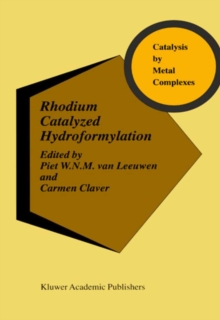
Homogeneous Hydrogenation PDF
by P.A. Chaloner, M.A. Esteruelas, Ferenc Joo, L.A. Oro
Part of the Catalysis by Metal Complexes series
Description
Homogeneous hydrogenation is one of the most thoroughly studied fields of homogeneous catalysis. The results of these studies have proved to be most important for an understanding of the underlying principles of the activation of small molecules by transition metal complexes. During the past three decades homogeneous hydrogenation has found widespread application in organic chemistry, including the production of important pharmaceuticals, especially where a sophisticated degree of selectivity is required.
This volume presents a general account of the main principles and applications of homogeneous hydrogenation by transition metal complexes. Special attention is devoted to the mechanisms by which these processes occur, and the role of the recently discovered complexes of molecular hydrogen is described. Sources of hydrogen, other than H2, are also considered (transfer hydrogenation). The latest achievements in highly stereoselective hydrogenations have made possible many new applications in organic synthesis. These applications are documented by giving details of the reduction of important unsaturated substrates (alkenes, alkynes, aldehydes and ketones, nitrocompounds, etc.). Hydrogenation in biphasic and phase transfer catalyzed systems is also described. Finally, a discussion of the biochemical routes of H2 activation highlights the similarities and differences in performing hydrogenation in both natural and synthetic systems.
For researchers working in the fields of homogeneous catalysis, especially in areas such as pharmaceuticals, plastics and fine chemicals.
Information
-
Download - Immediately Available
- Format:PDF
- Publisher:Springer Netherlands
- Publication Date:11/11/2013
- Category:
- ISBN:9789401717915
Other Formats
- Hardback from £154.85
- Paperback / softback from £154.85
Information
-
Download - Immediately Available
- Format:PDF
- Publisher:Springer Netherlands
- Publication Date:11/11/2013
- Category:
- ISBN:9789401717915










